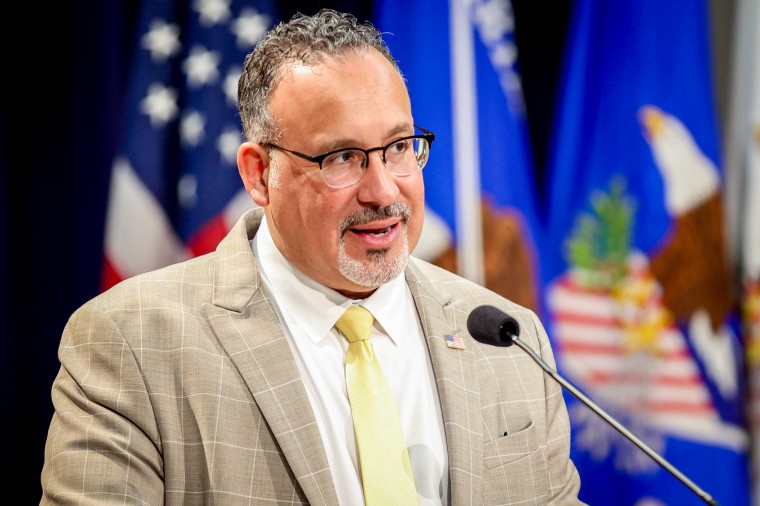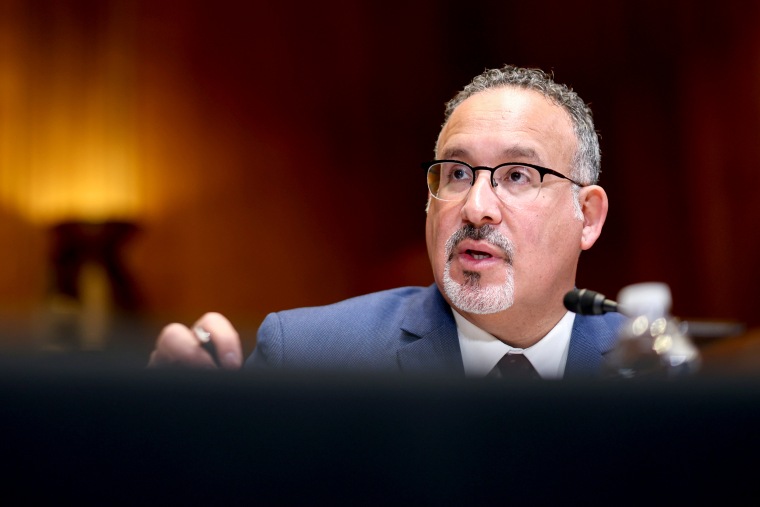Miguel Cardona, who rose from fourth grade teacher to President Joe Biden’s education secretary, fiercely defended the federal agency that oversees the nation’s public schools and that President-elect Donald Trump wants to eliminate.
A first-generation Puerto Rican from Connecticut, Cardona became the state’s first Latino commissioner of education. As he prepares to leave the U.S. Department of Education, he is warning against Trump’s vow to “get rid” of the department and allow each state to individually “handle education.” Trump has picked former wrestling executive Linda McMahon to oversee the department, a position that needs Senate confirmation.
“Protecting the federal Department of Education is protecting the rights and the opportunities of students. Otherwise, you’re going to have systems that look totally different in one state versus another, and not everyone will have the same opportunity to succeed in this country,” said Cardona, one of four Hispanic members of Biden’s Cabinet.
In an interview with NBC News this week in New York City, Cardona said he takes great pride in having been part of “an administration that looks like America” and having worked with a team of people that “come from the classroom.”

State and local governments have long been responsible for education, setting rules and providing most of the funding for schools. Though the federal department does not impose curricula or have a hand in most school policies, it manages federal grant programs and provides billions of dollars in supplemental funding to high-poverty K-12 schools — as well as covers the cost of education for students with disabilities. It also oversees the $1.6 trillion federal student loan program and determines what colleges must do to participate.
Because of a congressional mandate, the Education Department is tasked with assessing student progress at the national level and developing ways to improve education. It also collects statistics on enrollment, crime in school, staffing and other topics that support that mission.
Most importantly for Cardona, the department is charged with enforcing civil rights laws to prevent discrimination in federally funded schools. He considers this a key reason to safeguard the department.
“We don’t want to go backwards,” Cardona said.
“There are about 65 million students in this country who need civil rights protection, who need to have a department that can make sure the dollars are getting to where they’re supposed to go,” he said.
“Students need their districts and states to get guidance on how to support kids,” especially when it comes to addressing mental health needs and school violence, Cardona said. “That’s what we do. We provide that support.”
Karoline Leavitt, a spokeswoman for Trump’s transition team, told NBC News in a statement that the president-elect “believes that school choice is the civil rights issue of our time” and will “ensure all families have access to a great education, no matter their zip code.”
“Trump will improve academic excellence for all students,” the statement read, “by increasing access to school choice, empowering parents to have a voice in their child’s education, supporting good teachers, and returning education back to the states where it belongs.”
A look back
The Covid-19 pandemic, the fight over student debt relief and the end of affirmative action were some of the issues the country grappled with during Cardona’s time as education secretary.
When Cardona first stepped into office, more than half of the nation’s schools were closed. “People forget that,” he said while recalling working for nine months to reopen them.
Students struggled with the mental health repercussions of the pandemic and the yearlong lockdown, leading the Education Department to enlist more than 16,000 social workers and counselors to address the issue.
Cardona said providing those resources was among his proudest achievements, as well as increasing Pell Grants, federal scholarships and forgiving over $176 billion in student loans to nearly 5 million people during his term.
Courts repeatedly barred the Biden administration from implementing its one-time student debt forgiveness plan to cancel up to $20,000 in federal student loan debt for more than 40 million borrowers. So the administration provided debt relief under four existing debt cancellation programs: the Saving on a Valuable Education Plan’s early forgiveness, the Public Service Loan Forgiveness program, the total and permanent disability discharge plan, and the income-driven repayment plan.
Cardona worries about a future dismantling of these programs, saying they’ve allowed “people to go to college, buy homes and move on with their life.”
As a former teacher and public sector employee, Cardona said he was taking a bit of solace in having ramped up debt forgiveness for those in public service who had been paying off their loans for 10 years or more under the Public Service Loan Forgiveness program. “This was something that was passed by Republicans and Democrats in 2007,” he said.
“We provided debt relief to people that earned debt relief, and I’m proud of that because a lot of people challenge that,” Cardona said. “The same people that didn’t complain when we bailed out an airline industry or we bailed out banks; we were bailing out working-class Americans who work hard.”

In an interview with NBC News NOW on Wednesday, Cardona said many of the public employees who got debt relief are “people we said we need in our classrooms” during Covid as well as “firefighters, police officers, veterans; everyone that we called essential four years ago are benefiting from the Public Service Loan Forgiveness program.”
“No other administration has come close to the debt relief that we provided and fixing a broken system,” he said.
‘Good trouble’
Cardona warned that “there’s going to be a period of rain before the rainbow comes out” when it comes to education in the U.S.
“Students of color, who have historically been overlooked in admissions processes, have less access than they did three years ago,” Cardona said, in reference to the Supreme Court’s decision banning selective colleges and universities from using race as a factor in admissions. “It’s going to make us less competitive as a nation when only some of our students have access to higher education.”
According to Cardona, previous state-level bans against race-based affirmative action have given the country a glimpse of the consequences of prohibiting such a practice on a national scale.
In the nine states where bans took place, research found that the enrollment of students from underrepresented communities declined, even when other factors, such as class, were weighed more heavily.
“That’s probably going to happen in this country,” Cardona said.
Cardona said he looks at a rubber bracelet he wears on his right hand that reads, “good trouble,” in memory of the late Rep. John Lewis, D-Ga., who famously fought for civil rights.
“He fought, when he was young, to get freedoms that students were being denied. He sacrificed a lot so that we could move forward as a country,” Cardona said. “Yes, we are going to go into a dark era in which they want to close the Department of Education, stop affirmative action. … But we need to come together as a country and fight for what we believe — just like Congressman John Lewis did.”
